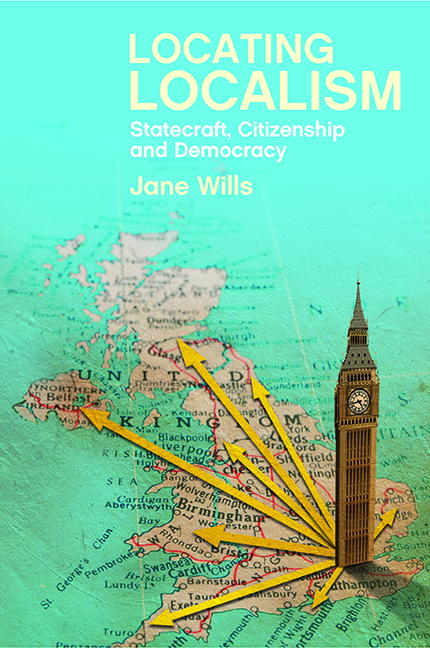Book contents
- Frontmatter
- Dedication
- Contents
- List of figures and tables
- Acknowledgements
- Introduction: the argument being made in this book
- one Making sense of localism
- two The geo-constitution and the long history of localism
- three The place of the people
- four Localist local government
- five Institution building for localist futures
- six Community organising: past, present and future
- seven A localist future?
- Appendix: Research design and methods
- References
- Index
Introduction: the argument being made in this book
Published online by Cambridge University Press: 05 April 2022
- Frontmatter
- Dedication
- Contents
- List of figures and tables
- Acknowledgements
- Introduction: the argument being made in this book
- one Making sense of localism
- two The geo-constitution and the long history of localism
- three The place of the people
- four Localist local government
- five Institution building for localist futures
- six Community organising: past, present and future
- seven A localist future?
- Appendix: Research design and methods
- References
- Index
Summary
All polities have a geographical division of political power (Maas, 1959; Berry, 1987). Authority, responsibility and power over decision making are unevenly distributed across space, being attached to an institutional matrix of political decision making that reflects the history of any particular state. Over the past 30 years, for a combination of reasons, momentum has been building to revisit the inherited spatial architecture that underpins politics in the UK. There is now a growing consensus about the need for greater devolution, decentralisation and localisation.
However, re-imagining and remaking the state, and recasting the behaviour of its cadre and citizens, is a difficult thing to do, especially when the institutional infrastructure to support the decentralisation of political decision making does not yet exist. Indeed, in this context there is a danger that the wave of devolution currently underway in England will simply involve the redistribution of political power from one set of elites to another; from politicians and officials in Whitehall and Westminster to those in the town halls of Manchester, Sheffield and our other great cities (Parker, 2015). Reaching the demos and doing something potentially more transformative will demand the creation of new civic infrastructure and capacity at the neighbourhood scale. Although a quarter of the population – largely those living in rural areas – are covered by long-established parish councils, the vast majority of the population have no access to this tier of government (NALC, 2015, 5). Moreover, even those who do are often disappointed by the constrained and unimaginative decisions being made.
This book explores the challenges posed by the weakness of our local civic infrastructure and its attendant impact on our civic capacity and democratic life in England. The book presents the findings from four different research projects that have been conducted to explore ongoing efforts by some government-funded organisations and groups of residents to set up new institutions in urban areas. The research exposed the valiant efforts being made by unpaid volunteers who want to make improvements to their local area. In the spirit of the early parish government that emerged in England after the Reformation (covered in much more detail in Chapter Two), these emergent bodies are focused on the provision of communal services and social events, on improving the quality of the local environment and reshaping the trajectory of local development.
- Type
- Chapter
- Information
- Locating LocalismStatecraft, Citizenship and Democracy, pp. 1 - 6Publisher: Bristol University PressPrint publication year: 2016



